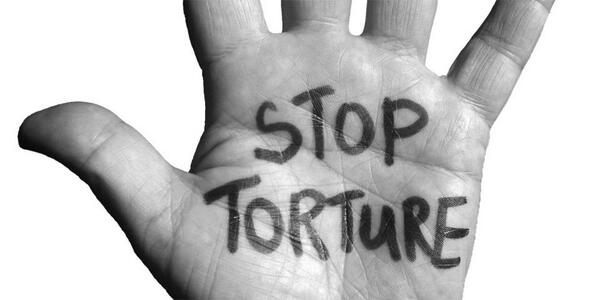26 June 2019 – Today, on the International Day in Support of Victims of Torture, Americans for Democracy & Human Rights in Bahrain (ADHRB) highlights victims of torture in the Gulf and calls on countries to halt this abusive practice, investigate all allegations of torture, and hold perpetrators accountable.
In Bahrain, serious violations like torture are imbedded into the practices of the Ministry of Interior (MOI) security forces. This de facto policy is generated not just by a culture of impunity, but also by a system of incentives aimed at rewarding perpetrators. As the government has gradually tasked the MOI with enforcing new and more stringent prohibitions on fundamental freedoms, the most ruthless officers are promoted, not punished. The MOI has been directly implicated in at least 570 cases of torture since 2011, and none of these abuses could occur without the knowledge and approval of the highest command echelon, up to Interior Minister Sheikh Rashid bin Abdullah AlKhalifa. The United Nations (UN) Committee Against Torture (CAT) concluding observations on Bahrain noted that reports of Bahraini authorities subjecting individuals in their custody to torture and ill-treatment remained numerous, widespread, and consistent. Furthermore, the CAT raised concern over the lack of independence of the government’s accountability mechanisms, the low number of torture convictions in the country, and the government’s failure to hand down punishments commensurate with the gravity of such crimes.
Torture is a systematic tool used by Bahrain against high profile cases like Abdulhadi AlKhawaja, who was tortured upon arrest – resulting in a broken jaw. Other members of the Bahrain 13 – a group of opposition leaders, rights activists, bloggers, and Shia clerics arrested in connection with their role in the February 2011 protests – were also subjected to torture, including Dr. Abdujalil AlSingace, Abdulwahab Hussain, Hassan Mushaima, and Mohammed Habib al-Miqdad. Bahrain additionally uses torture against human rights defenders like Nabeel Rajab, who was held in solitary confinement and subjected to medical neglect, and Naji Fateel, who was waterboarded, beaten, sexually assaulted, hung by his hands from the ceiling, and subjected to electric shocks. Regular Bahrainis are similarly tortured, including Habib Hasan Yusuf, Ali Ahmed and Mohamed Ahmed Fakhrawi, and Sayed Hashem Alawi to name a few.
The use of torture is equally widespread in Saudi Arabia – which recently executed several torture victims and continues to torture women human rights defenders. On 23 April 2019, Saudi Arabia executed 37 men for alleged terrorism crimes, including Abbas al-Hassan, Mujtaba al-Sweikat, Salman Qureish, and Abdulkarim al-Hawaj, who were all tortured following their arrests. Another individual executed was Munir al-Adam, a Saudi citizen who was tortured to the extent that he permanently lost hearing in one ear. UN High Commissioner for Human Rights Michelle Bachelet strongly condemned the executions in spite of repeated appeals by the UN human rights system about the lack of due process and fair trial guarantees and allegations that confessions were obtained through torture.
In 2018, Saudi Arabia conducted a series of arrests specifically going after activists who publicly advocated on behalf of ending the female driving ban, which Saudi Arabia’s Crown Prince Mohamed bin Salman (MBS) lifted in June of 2018. Those arrested included activists Nouf Abdulaziz, Loujain al-Hathloul, and Eman al-Nafjan, all of whom were held incommunicado, tortured, and faced prolonged solitary confinement at the hands of Saudi authorities. In February 2019, a cross panel study by three British MPs confirmed that the conditions faced by these Saudi activists and others constituted torture under both international and Saudi law. These women have also been the subject of a UN Special Procedures Urgent Appeal (SAU 11/2018) to the Kingdom of Saudi Arabia.
In the United Arab Emirates (UAE), torture runs rampant in prisons, both domestically and internationally. Reports have shed light on the likely existence of secret prisons run by the UAE in Yemen, and the horrendous acts of torture that have occurred in these facilities, including the electrocution and abuse of genitals, rape and sodomization, and severe beatings, in addition to other gruesome acts. The UAE also has a history of abuse in domestic prisons. In 2015, security forces forcibly arrested and disappeared Dr. Nasser Bin Ghaith in relation to exercising his right to free expression. While held in custody for over a year prior to his sentencing, Dr. Bin Ghaith was physically tortured, beaten, and deprived of sleep for up to a week. In 2017, human rights defender Ahmed Mansour was also arrested and forcibly disappeared. While detained, Mansour was subjected to torture and ill treatment. More recently, on 4 May 2019, prisoner Alia Abdulnoor died in custody following a battle with terminal breast cancer. While incarcerated, Abdulnoor was denied adequate treatment and her family’s request for her medical release was rejected. In a statement, the UN Office of the High Commissioner for Human Rights (OHCHR) called on the UAE to investigate the circumstances surrounding her death, as well as the credible allegations of torture and ill-treatment, and to hold those involved accountable.
“This dark trend of torture will remain as long as the perpetrators are able to operate with impunity. We cannot let countries continue to sanction such gross violations of human rights,” says ADHRB Executive Director Husain Abdulla. “We owe it to the victims of torture to do everything in our power to pressure countries like Bahrain, Saudi Arabia, and the UAE to eradicate torture and abolish the existing impunity for offenders.”
On International Day in Support of Victims of Torture, ADHRB calls on the international community to work together to pressure countries to eliminate the use of torture and urges countries to take concrete measures to investigate allegations of torture and hold all abusers accountable.





